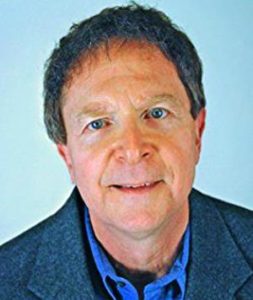Jack Challem – In Memorium

Jack Challem – In Memorium
1951 – 2017
Jack was my good friend. Our professional relationship was based on a mutual love for the power of good nutrition. That’s how I met Jack. Jack was a friend of Hugh Riordan. Hugh was one of the several great orthomolecular psychiatrists who opened up the frontier of molecular nutrition as a way of helping people with chronic mental illness. Jack was an internationally recognized health and nutrition author, also known as “The Nutrition Reporter.” He wrote more than 20 books on nutrition and health.
There’s little I can add to the excerpts below, taken from Jack’s autobiographical essay in The Fountain, which is a tremendous compendium of essays written by Jack and his special friends and nutritional associates, co-learners, and mentors. (The Fountain is available on Amazon.com/books.) My essay in The Fountain is entitled “Healthy Relationships and Longevity.”
I wrote on this topic because I always had a gnawing feeling that unhealthy relationships were the Achilles heel in Jack’s personal life, and a danger to his otherwise good health status. I had hoped that he would see that one cannot simply “nutrition away” toxic relationships. I prepare this article with a deep sense of gratitude for the solid friendship that Jack and I shared for over two decades prior to his passing.
I will always remember Jack for his tremendous curiosity and knowledge, his amazing artistic capabilities (he leaves a wonderful legacy of photography), his sincere interest in people, his scientific understanding of nutrition (in spite of having no specific degree in that area), and finally his ability to have touched so many people through his power to communicate complex ideas in an understandable way. His many books, his articles, and his newsletters are a tremendous gift to humanity.
–Ron Hunninghake
Jack’s Introduction to The Fountain
In our own way, each and every one of us would like to find the fountain of youth. The reason is simple. We’d like to live as long as we can,  erase our illnesses and age-related debilities, and enjoy as much as we can in life. In this book, we bring together twenty-five experts from medicine and natural health to relate their own personal experiences and to share their recommendations for achieving a long and healthy life.
erase our illnesses and age-related debilities, and enjoy as much as we can in life. In this book, we bring together twenty-five experts from medicine and natural health to relate their own personal experiences and to share their recommendations for achieving a long and healthy life.
Throughout history, people have sought a fountain of youth, and uncovering the secret to eternal youth has been a frequent theme in myths, legends, and even science fiction. Medieval herbs, such as lemon balm, and various concoctions created by alchemists were once thought to be elixirs of life. These nostrums evolved into the patent medicines of the nineteenth and early twentieth centuries and can still be seen in the panacea-like claims proffered by modern pharmaceutical companies.
The contributors to The Fountain have based most of their recommendations on solid science and, to a great extent, on nutritional medicine and clinical practice. Most are physicians, researchers, nutritionists, and health experts of other types. Their recommendations focus primarily on the importance of nutrition and supplements, rather than on medical technologies or pharmaceuticals.
The reason is very simple: We are biochemical creatures (at least in our physical makeup), and nutrients form the building blocks of all the body’s biochemicals, including genes. That said, some of the contributors address the roles of healthy emotions, relationships, physical activity, and control of stress in promoting health and longevity. All these aspects of life figure in our lives and, directly or indirectly, influence our biochemistry.
We hope this book leads you to your own fountain of youth. (Challem, 2009, p. 1-3)
My Personal and Professional Journey in Nutrition
I am a best-selling author of nutrition and health books and I write for many different magazines. I also lecture consumer and medical groups on nutrition topics, and I coach people one-on-one to help them develop better eating habits. But most of what I do in this field and the nutrition recommendations I make are based on what I have learned from other people. Many events and individuals have shaped my perspectives on nutrition and health.
The first and perhaps most pivotal event was the death of my older brother. When I was fifteen years old, I saw him waste away from cancer, living in great pain for nine months. Much of his pain was the consequence of medical treatments. The lasting effect of that experience on me has been the firm belief that no one should ever die that way. Looking back, my brother’s death fundamentally influenced much of my personal and professional journey in life.
By that time I was also interested in becoming a writer. A high school English teacher, Harold Miller, taught me to think critically— that is, not to take anything at face value—and he also helped sharpen my writing skills. Several years later, in college, Dr. Dewitt Garrett, a biology professor, made an offhand remark about “suppressed treatments” for heart disease and cancer. After class, I asked for more information about those treatments, and we talked about nutrition and vitamins. Within a couple of weeks, I started taking vitamin C and E supplements, and I had a very dramatic response to the vitamins.
I had recently been diagnosed with a pilonidal cyst—a particular type of chronic, draining cyst or abscess. One week after starting the vitamins, the cyst burst, completely drained, and healed. That was around forty years ago. Most people who have a pilonidal cyst suffer with it throughout their life. Needless to say, I became convinced about the benefits of nutritional therapies.
The Experts I’ve Learned From
After graduating from college, I was lucky enough to start writing for some of the health magazines and, perhaps more importantly, meeting and becoming friends with the physicians who pioneered nutritional therapies. They included Evan Shute, MD, and his brother Wilfrid Shute, MD, the first doctors to use vitamin E to treat coronary heart disease.
I got to know Abram Hoffer, MD, PhD, who was the first doctor to use high doses of vitamins B3 and C to treat schizophrenic patients—and to enable them to experience the same reality that you and I see. Dr. Hoffer, still sharp at age ninety-one, has a rare appreciation of medical history and incredible clarity in thought, and I have learned much from him over the years.
Carl Pfeiffer, MD, and Hugh Riordan, MD, were pioneers as well, and Dr. Riordan was eclectic in his thinking and a particularly strong influence. I am also indebted to Ron Hunninghake, MD, who has become a close friend and the best person for me to brainstorm with on nutrition issues. I also learned a great deal from researchers, including Denham Harman, MD, PhD, who developed the free-radical theory of aging and disease; Lester Packer, PhD, who explained a great deal about antioxidant biochemistry to me; Bruce Ames, PhD, who did the same in terms of energy production in mitochondria; and Loren Cordain, PhD, who helped me make sense of the Paleolithic diet and many other important aspects of nutrition, such as acid-alkaline balance. I met Nobel laureate Linus Pauling, PhD, and talked with him several times on the telephone. Dr. Pauling was a true genius and, like Dr. Hoffer, he had exceptional clarity in thought (not surprisingly, they frequently collaborated). They and many others over the years have been my teachers—not in classes, mind you, but in explaining everything from the minutiae of nutritional biochemistry to the bigger real-life implications of orthomolecular medicine.
I am also very self-directed. I thrive on learning, and am an avid reader of newspapers, magazines, and medical and scientific journals. Years ago, I learned the advantage of living near a medical library, where I could retrieve full-text journal articles—after all, not everything is available for free on the Internet. This is part of the story of how I became interested in natural therapies and wellness. But there is another important aspect of my journey to relate before I discuss my recommendations for a healthy, fully functional life.
Four Dietary Recommendations
Sometimes people ask me why nutrition is so important. The answer is relatively simple: Our entire biochemistry, including the synthesis, repair, and regulation of our genes, depends on nutrients. Here’s a useful analogy: Think of building a house with either shoddy or quality materials. If you use cheap construction materials, the house will not be structurally sound. Similarly, if you opt for poor-quality nutrition, your body will not be structurally sound. Conversely, if you build a house with sturdy components, it will resist damage from earthquakes and hurricanes.
Likewise, if you eat healthy foods, you will better weather life’s inevitable stresses. So, what do I recommend in terms of healthy foods? It has taken me about thirty years of nutrition writing to distill almost everything into four simple recommendations.
-
Eat Nutrient-Dense Foods
These are foods that provide the greatest amount of high-quality nutrition in every bite or calorie. Two broad food groups meet this criterion. One is quality protein—in my mind, fish, chicken, turkey, eggs, and lean meats (preferably grass-fed, not corn-fed).
The other food group consists of high-fiber (nonstarchy) vegetables and fruits. These include salads, broccoli, cauliflower, raspberries, blueberries, cherries, kiwi, and most other vegetables and fruits.
Meanwhile, avoid or limit your intake of low-nutrient-density foods, which include most starchy grain-based foods, including breads, cereals, bagels, muffins, and pastas; as well as sugary foods, such as candies and most types of energy bars. Potatoes, rice, and bananas are high in sugar-like starches, and people with prediabetes or weight issues should strictly limit their consumption of sugar-like starches. Although many people tout the health benefits of whole grains, they are nutritionally weak compared with vegetables.
-
Eat Fresh Foods
The healthiest foods are almost always fresh foods, and the unhealthiest foods are almost always packaged foods. Fresh foods are higher in nutrients because they have not undergone industrial processing and refining. By contrast, packaged foods have usually been processed, refined, or tampered with in some way. Packaged foods come in boxes, cans, jars, bottles, tubs, and bags. Nearly all packaged foods have added salt, sugars, junk oils, or trans fats—or all of them. There are a few exceptions that are healthy, such as olive oil and frozen vegetables and fruits, as long as nothing else has been added to them. Fresh foods mean you have to prepare your meals from scratch. That will take a little extra time, but you can find that time (perhaps by checking e-mail less each day). When someone complains that cooking from scratch takes too much time, I tell him that he can either make the time to cook today or make the time to be sick and disabled in a few years.
-
Eat Foods That Look Like They Did in Nature
Excuse me if this sounds a little folksy, but I believe that foods should have some resemblance to what they looked like in nature. A piece of chicken should look like it was once part of an animal, and a piece of fish should look like it came from a fish. Most fresh foods do look something like they did in nature. Chicken nuggets don’t look like anything that was grown or raised, and neither does fish and chips (French fries).
-
Hydrate Yourself—Mostly with Water
Our bodies consist mostly of water, and aging is often characterized by a shrinking of cells other than fat cells. The oxygen and hydrogen atoms that form water are needed for myriad biochemical reactions in the body, and many physicians have told me that they have seen improvements in their patients after doing nothing other than drinking more water. Although many people have complained about the huge amount of waste created by disposable plastic bottles, it is heartening to see many people drinking water instead of soft drinks. Other healthy beverages include sparkling mineral water, green and black teas, herbal teas, organic coffee, green (vegetable) drinks, and coconut water.
In Conclusion
As far as I can tell, each of us has one life on this earth and one opportunity to live the best and healthiest life we can. Eating health-promoting foods and taking supplements are two important steps toward living a long, fully functional, and enjoyable life.
Don’t treat nutrition as a rigid doctrine—that’s the problem with old-school dietitians and physicians who think in terms of 1950s Betty Crocker nutrition. Instead, keep up with the latest findings—a new discovery tomorrow could change much of what you currently know and take for granted. Above all else, remember that good nutrition should be part of a balanced approach to life in general.
(Challem, 2009, excerpts from p. 29-38)
Challem J. The Fountain: 25 Experts Reveal Their Secrets of Health and Longevity from the Fountain of Youth. Laguna Beach: Basic Health Publications, Inc., 2009.





